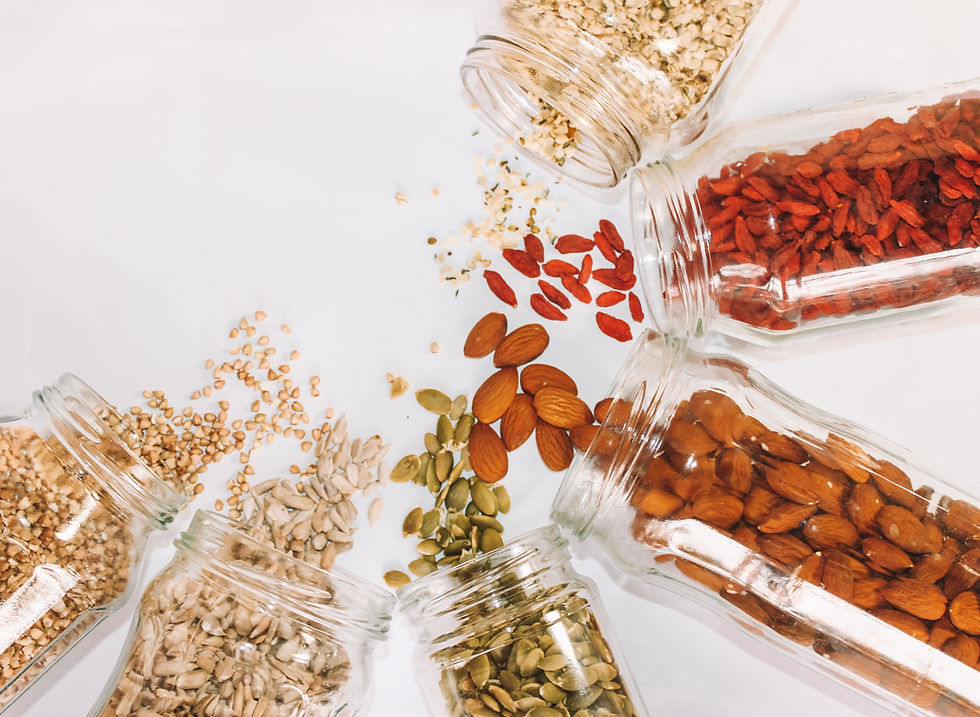Magnesium: a vital mineral for menopause, stress & fatigue
- Jasmin Sturm
- May 1, 2024
- 3 min read
Updated: May 14, 2024

Magnesium is one of the first minerals that I think of with women's health. Other minerals such as iron, calcium and zinc are important too, however magnesium comes up time and again.
If you are struggling with:
Fatigue
Burnout
Hormonal issues
Stress
Memory
Low mood
Period pain
Headaches
High blood pressure
You may be lacking in this mineral and it may be worth assessing your dietary intake of this mineral. Magnesium is used in over 300 enzymatic reactions in the body and is specifically required for the healthy functioning of our nervous system, our heart and bones, our metabolism and for healthy energy levels.
Magnesium deficiency is shockingly common — some estimates say that up to 90% of the population may not be getting enough of this essential mineral.
There is much research out that states we are not getting enough magnesium in our daily diet to meet our bodies needs. This maybe due to an number of factors:
periods of physical or emotional stress
some medication
poor soil
inadequate intake or poor absorption
lifestyle factors (see below)

Diet and lifestyle factors that contribute to magnesium deficiency:
drinking alcohol every day or more than 7 alcoholic drinks per week
strenuous exercise more than 3 times a week
drinking more than 3 coffees daily
eating processed food or junk food regularly
having high sugar foods daily
consuming a diet high in fatty foods (fried foods, ice cream)
a diet low in green leafy vegetables, seeds and nuts (less than one serve daily)
having undigested food or fat in your stools more than 3 times weekly (signs of malabsorption.)
One molecule of glucose (sugar) requires 28 molecules of magnesium for it to be metabolised!

What foods are high in magnesium?
Dark leafy greens (spinach, kale, Swiss chard)
Nuts and seeds (almonds, cashews, pumpkin seeds) unsalted & raw are best
Whole grains (brown rice, quinoa, oats)
Legumes (black beans, chickpeas, lentils)
Avocado
Bananas
Fatty fish (salmon, mackerel)
Dark chocolate
Edamame

When should I take a magnesium supplement?
In periods of physical or emotional stress, or if you are in perimenopause or menopause supplementing with magnesium can be incredibly beneficial with managing (and reducing) your symptoms.
The misleading nature of blood tests for magnesium levels
One of the challenges in detecting magnesium deficiency is that standard blood tests can be misleading. Since only 1% of the body's magnesium is found in the blood, these tests do not provide a complete picture of your magnesium status.
The body tightly regulates blood magnesium levels, drawing from stores in the bones and muscles when necessary to maintain a consistent concentration in the bloodstream.
As a result, a person may have a significant magnesium deficiency without it showing up on a routine blood test.
Which Magnesium is best?
There are many types and forms of magnesium available - some forms don’t suit those who get loose bowel motions, other forms are good for constipation. Magnesium is available as a powder, liquid, capsules, tablets, tissue salts, in a cream or oil. It can be overwhelming when considering all the options.
My advice is to steer away from cheap supplements as they are often full of fillers and other additives. They are often made of the cheapest and less absorbable form of magnesium. In general I prefer to use magnesium citrate or bisglycinate.
Magnesium citrate travels straight across the cell membrane into the cell so is well absorbed. If you feel that it irritates your gut then you need to start really slowly. (Think of a dry sponge, how it doesn't soak up water straight away it needs to be wet first. This may indicate that you are very low in magnesium.)
If you try some magnesium give yourself a month at least before you decide it hasn't worked as it can take this long to start replenishing your magnesium stores.
If you are wondering whether low magnesium contributing to your symptoms, or you are taking one but not getting benefit: book a Free Discovery Call to discuss how I can help you.




Comments